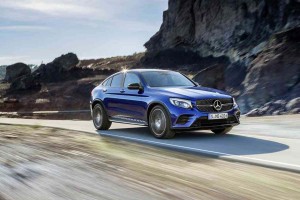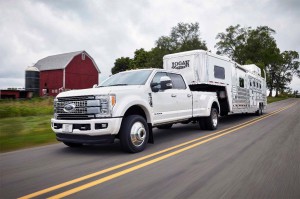
Pam Fletcher, GM's electric vehicle chief, and North American President Alan Batey hold the Motor Trend Car of the Year trophy.
It hasn’t even reached showrooms yet, but the Chevrolet Bolt has landed a big victory, the new battery-electric vehicle being named the Motor Trend Car of the Year.
The widely followed award could give General Motors’ first mainstream, long-range BEV a leg up on competitors – including Tesla – at a time when plug-based vehicles are only beginning to show signs of momentum in a market largely motivated by cheap gasoline.
Separately, the enthusiast publication also named the new Mercedes-Benz GLC its SUV of the Year, while the newly redesigned Ford Super Duty picked up a trophy as Motor Trend’s Truck of the Year during a ceremony marking the start of the annual Los Angeles Motor Show.
(Chevy begins production of the new Bolt EV. Click Here for the story.)
But it was the new 2017 Chevrolet Bolt that is drawing the spotlight, the battery car beating out a wide range of conventionally powered vehicles at a time when consumers are just slowly beginning to pay attention to green machines.
The Bolt’s big selling point is that it offers plenty of range for relatively little cash. At an EPA-rated 238 miles per charge, it can go nearly three times the distance of most of today’s electric vehicles, with the exception of the Tesla Models S and X. And at a base price of $37,495 – before factoring in a $7,500 federal tax credit, the new Bolt carries only a minimal price premium over similar, conventionally powered models.
The closest competitor will be the Tesla Model 3, but that is currently expected to carry a slightly higher price tag and deliver only about 200 miles per charge.
According to Motor Trend’s editors-cum-jury, the Bolt would have been a strong contender even if it didn’t have a long-range battery propulsion system.
The new model just went into volume production at a GM plant north of Detroit, the automaker will only say that it plans to have the first Chevy Bolt hatchbacks in showrooms before the end of this year. The company also plans to make some of the battery-cars available to drivers for the ride-sharing service Lyft. GM invested $500 million in Lyft earlier this year and has also offered several other models to the service’s drivers through a low-cost weekly lease program.
The Bolt could begin stacking up the honors in the weeks and months ahead. It was one of the semi-finalists for North American Car of the Year, with the three finalists set to be announced at the Los Angeles Auto Show on Tuesday. Chevy’s electric vehicle is also one of five finalists for Green Car of the Year. The winner of that award also will be announced at the L.A. show this week.
(Click Here to see who else is up for Green Car of the Year.)
Many experts believe that by dropping prices and boosting range, the industry may finally begin to gain some traction for plug-based products. So far this year, however, pure battery-electric vehicles have made up barely 0.3% of the overall American market. Add in plug-in hybrids and conventional hybrids, such as the Toyota Prius, and the figure still barely nudges 3%.
But a forecast by IHS Automotive predicts battery-based vehicles could hit global sales of 3 million by 2023, with some observers betting that will actually come closer to 6 million. With the new Trump Administration threatening to all but abandon the EPA and many clean air and mileage rules, some experts fear U.S. demand could actually fall. But other believe that sales will keep rising if sold products, such as the Bolt, become the rule, rather than the exception.
(Long-skeptical Toyota reversing course and planning wave of battery-cars. Click Here for the story.)



